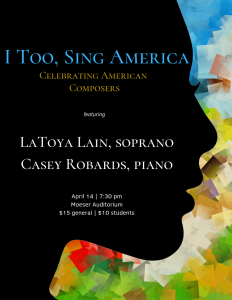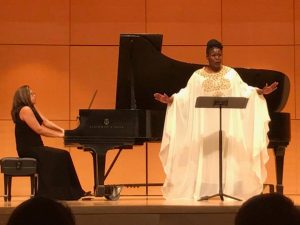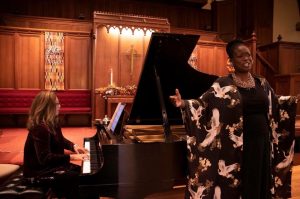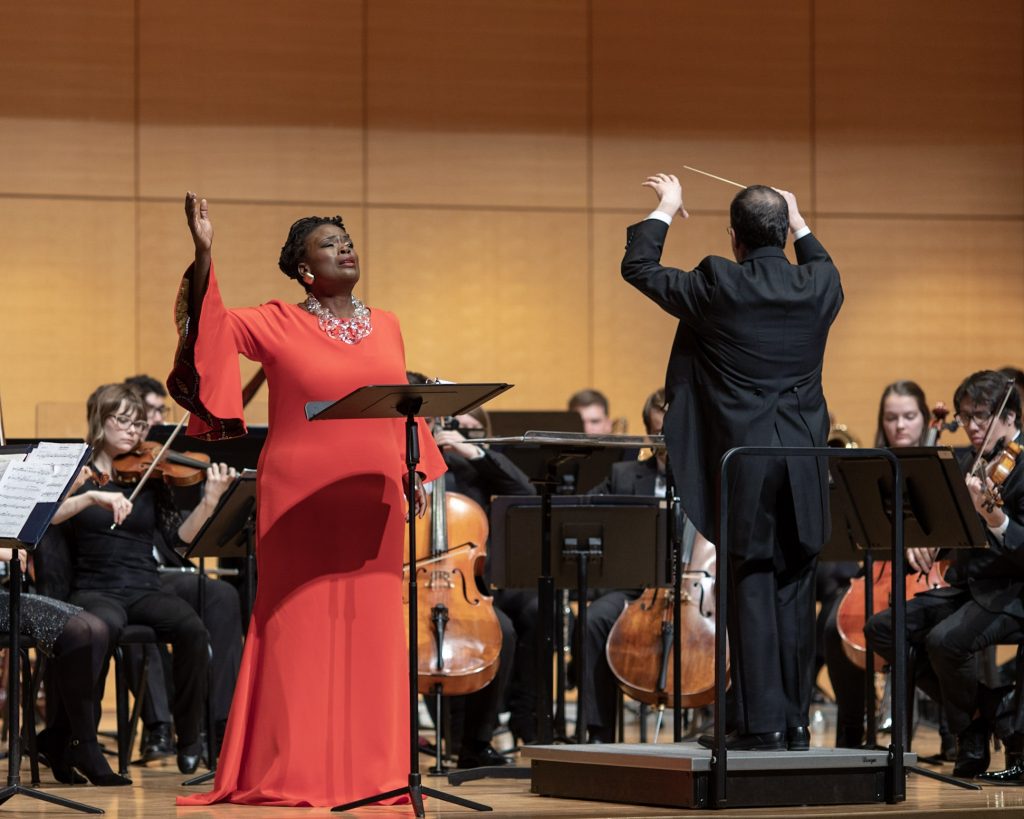by Parth Upadhyaya
 LaToya Lain sits at the desk in her office at Kenan Music Building with her head buried in a book and her back turned to the window overlooking the intersection of Colombia and Franklin Street.
LaToya Lain sits at the desk in her office at Kenan Music Building with her head buried in a book and her back turned to the window overlooking the intersection of Colombia and Franklin Street.
Her eyes locked to the pages in her hands, she reads a song that features American poet and social activist Langston Hughes’ famous poem, “I, Too.”
The first few lines read: I, too, sing America. I am the darker brother. They send me to eat in the kitchen when company comes. But I laugh, and eat well, and grow strong.
An assistant professor of voice in her first year with the UNC Department of Music, Lain found the inspiration to organize her upcoming recital, “I Too, Sing America: Celebrating American Composers,” from Hughes’ words. She’s also found plenty of inspiration in her own journey as an African American female opera singer.
“Every time I hear that poem, I think about sometimes, there are prejudgements — especially in this field — in the performing arts,” Lain said. “Often times, people will assume that because I’m African American, I don’t sing opera. That would be the furthest thing from them grasping that. Like, ‘Oh, you sing opera? How did you get into that?’”
The recital will take place on April 14 at 7:30 p.m. in Moeser Auditorium in Hill Hall and will feature Lain as the soprano and Casey Robards — a lecturer at the University of Illinois’ School of Music — on the piano. Tickets will be $15 general admission and $10 for UNC students and faculty.
Lain and Robards will perform four selections of art songs by composers of various demographics. The selections include: “When I Crossed That Line to Freedom: Songs of Harriet Tubman,” by Nkeiru Okoye; “Four Songs for Soprano, Cello, and Piano,” by André Previn; “Sonnets from the Portuguese,” by Libby Larsen; and “Cantata,” by John Carter.

“These composers represent what this country is,” Lain said. “It’s the combination of experiences and cultures. It’s not a melting pot; it’s a salad. We all have our own identities. We have our own experiences and our own cultures and our own things that define us. And the idea is not to melt it away to where it doesn’t exist … The idea is to celebrate each individual ingredient.”
Lain’s musical career started when she began playing the clarinet in the second grade. But she didn’t find her love for voice until she auditioned for the New Orleans Center for Creative Arts, a performing arts high school in her hometown, at the end of her 10th grade year.
While it would’ve made sense to audition as a clarinetist, Lain didn’t bring the instrument she’d been playing for eight years to the audition. She wanted to try something she’d never done — singing.
“I remember my parents were like, ‘Can you sing?’” Lain recalls with a laugh.
Lain had to sing The Star Spangled Banner as part of the audition. She wanted to mimic Whitney Houston’s 1991 Super Bowl performance. But an opera teacher, one of the judges of for the tryout, told her to sing it in a more classical style.
Though Lain, admittingly a bit stubborn as a 15-year-old, wanted to attempt the song with the same boldness and flair that Houston had, she listened to the teacher.
From there, she spent two years at the school, learning opera from that same instructor. Though she hadn’t sung prior to that audition, she says opera just “kind of found” her.
“Even though I didn’t know that I was interested in it, it was where my voice wanted to be,” Lain said. “I didn’t really sing R&B; I didn’t sing gospel, at all. But my voice wanted to sing opera.”

In rare air as a black woman in opera, Lain didn’t have many people that resembled her to look up to. But she used Jessye Norman, a famous African American female opera singer, as inspiration as she went on to study voice at the University of Cincinnati, Florida State University and the University of Nevada, Las Vegas.
At her last teaching stop, Central Michigan University’s School of Music, where she started in 2013, Lain was the first tenured-track black professor.
Aside from teaching, she’s also performed at some of the world’s biggest stages. In 2017, Lain made her Carnegie Hall debut. And in the summer of 2018, she was one of eight singers chosen to participate in the Opera Stage Program for Dramatic Voices in Berlin, Germany.
Her own experiences influence her to use music to tell stories of hope, freedom and overcoming adversity. She hopes she can do the same with “I Too, Sing America.”
The recital will open with a song cycle about Harriet Tubman, the abolitionist and freedom fighter who crossed the Mason-Dixon line multiple times to rescue many people from slavery.
“I learned about Harriet Tubman when I was about 10 or 11, and since that time, she’s always been a hero to me and somebody who I claimed lineage to because of her strength and her resiliency,” Lain said. “And I always feel that I’m standing on her shoulders and the shoulders of women like her.”
The second selection, “Four Songs for Soprano, Cello and Piano,” was composed by German-American André Previn, who recently passed away. UNC music professor Brent Wissick will play the cello to accompany Lain this selection.
Libby Larsen’s “Sonnets from the Portuguese” is the third selection in order and is a piece representative of the experiences of women, Lain says.
And the piece Lain and Robards will close the performance with, “Cantata” by John Carter, is a collection of tunes based on negro spirituals.
Each selection chosen for the upcoming show is diverse, whether it be in its explicit message or in the background of the cycle’s composers. Lain’s path to prominence in opera and in the music world, in general, motivate her to shine light on stories that aren’t usually heard — which is what she hopes to do when she takes the stage at Moeser Auditorium.
“We all want the same things,” Lain said. “We all struggle. And we all want to overcome our struggles and find victory in them. I feel a responsibility, as a black woman, that my program is diverse and that it represents what the world really looks like.”

